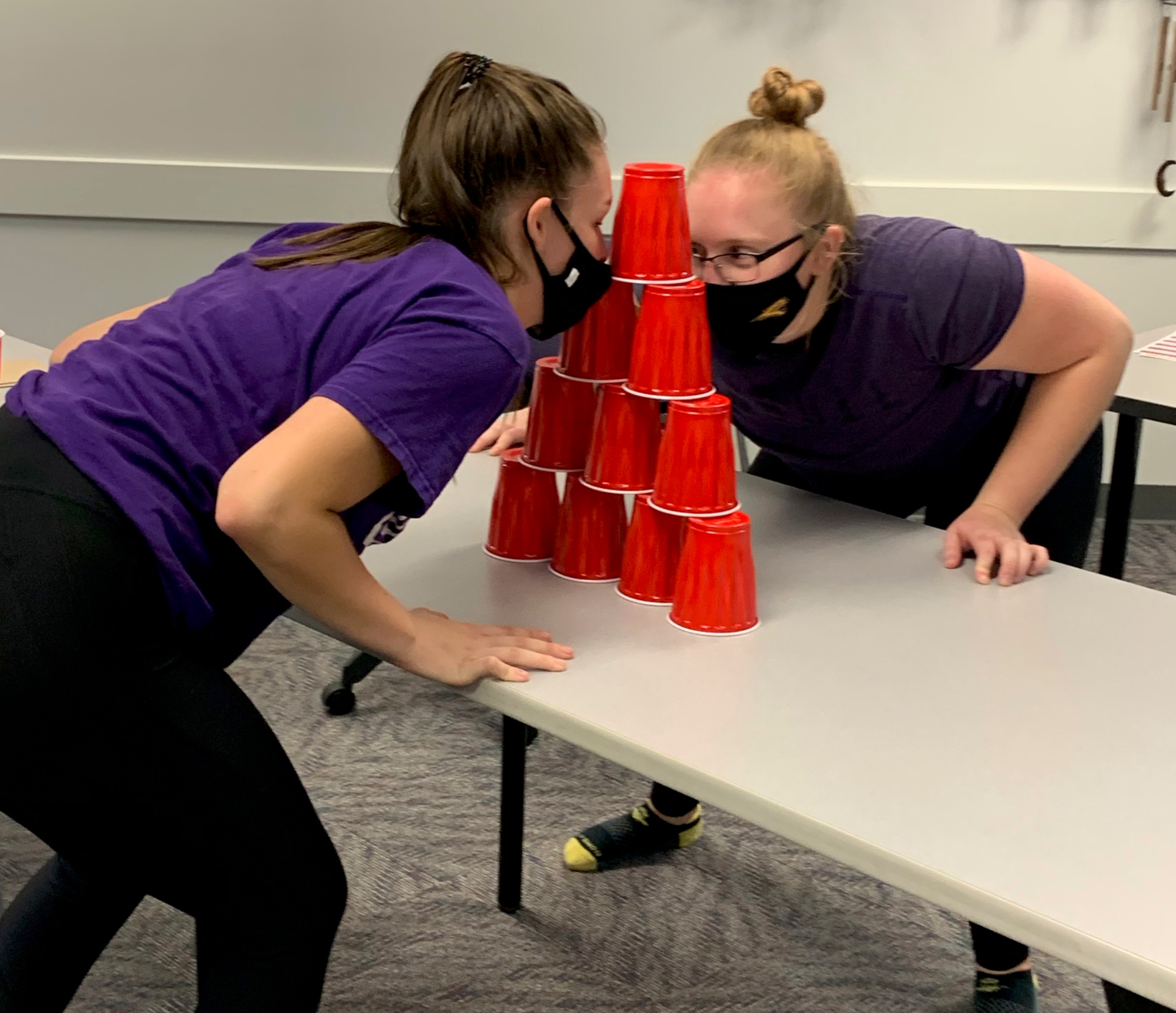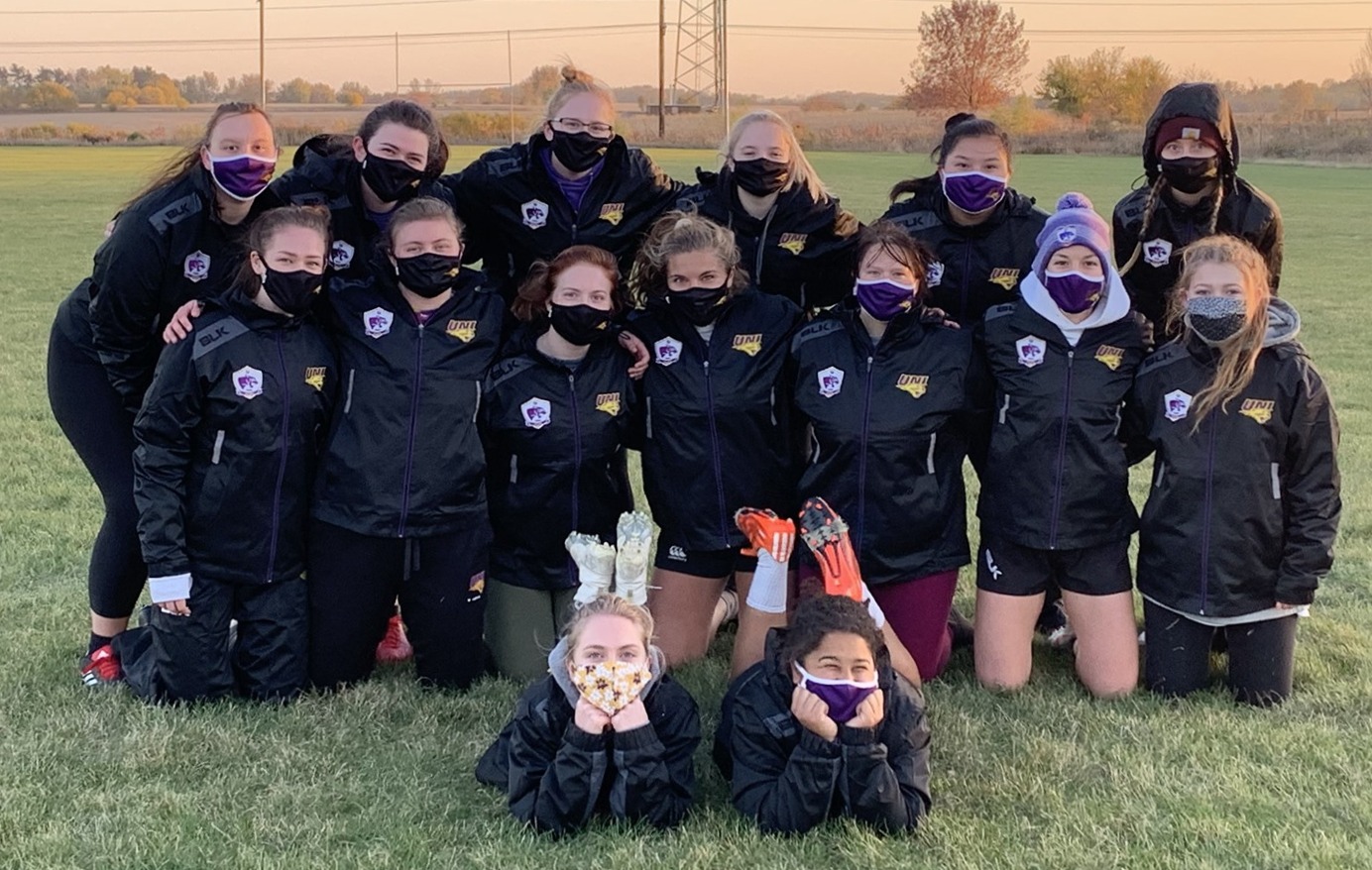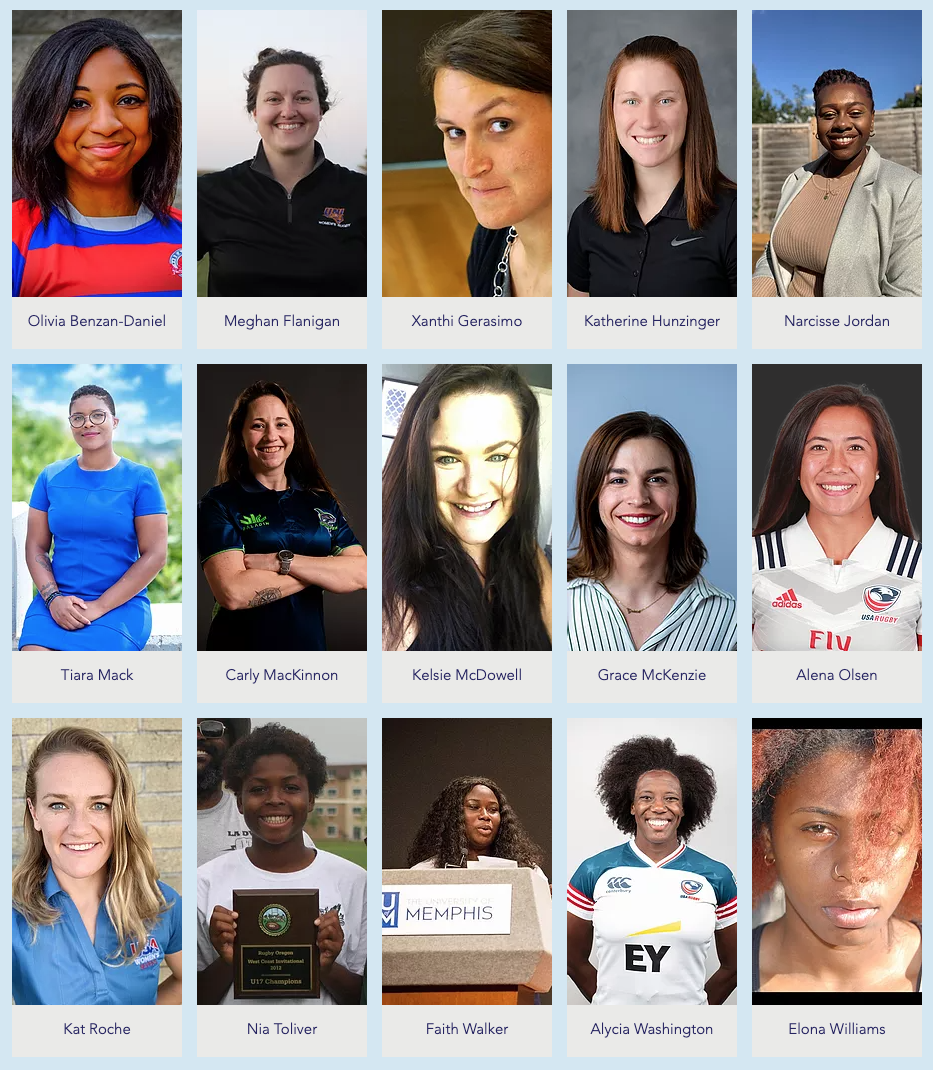Four teams are still competing in the National Collegiate Rugby (NCR) virtual 15s championship season. The semifinalists all hail from the Midwest and are tallying points through this final week’s worth of tasks. The champion will be named on Sunday, Nov. 15 via Facebook and will receive full team kit from sponsor Rhino Rugby.
Related team profiles: Semifinalists Univ. Chicago • Univ. South Dakota • Winona State
The University of Northern Iowa (UNI) is new to NCR, having previously competed in USA Rugby’s fall competition through the DI Midwest conference. Nevertheless, the Panthers were primed for a successful fall with a new organization.
“We did a virtual season ourselves in the spring, back when quarantine first started, just to keep us active,” UNI head coach Meghan Flanigan said. “It worked really well for us in the spring and we knew it would help retain and recruit players in the fall. So even though we didn’t know the whole details of the fall season when we started, we had an idea of what that could entail and hit the ground running.”
The Panthers had vetted some of the organizational aspects of a virtual season, and continued using things like Google Docs and a private Facebook Group in keeping teammates accountable. But it also helped that UNI was coming off an active, engaged summer (read: Rugby & Race, A Reckoning) that built momentum for the fall.
“We found a local organization here in Cedar Falls and Waterloo: the Iowa African-American Heritage Trail,” Flanigan reflected on the summer. “Charles [Pearson] did research on the history of the Black community in Cedar Falls and made historical markers so you could go on your own trail walk around the city. We made these equality t-shirts and raised $600 for the project, and we’re working with him more.”
Flanigan explained that the team is also invested in the Rugby For All campaign, which opposes World Rugby’s ban on transgender athletes at the international level. Players have been proactive in their research and Flanigan herself has done some graphic design work for the movement.

“They’ve been very involved on campus, participating in marches and working with men’s team,” the coach said. “In past years, our men’s and women’s programs have been close, but not the closest when working together. So it’s been cool to see players from both sides come together and work for a common good.
“There’s been a huge culture shift in the spring, early summer, and it’s neat to see,” Flanigan continued. “Even something as simple as changing our wording when we’re recruiting on campus and making sure we’re inclusive of everyone – it’s going to have a big impact going forward.”
Those efforts impacted this year’s recruitment class. There’s better diversity, and Flanigan was pleased to hear the team described as a “safe place.” Additionally, 10 freshmen joined this fall, which is uncommon. Typically, UNI newcomers are friends of teammates, and thus older, but Flanigan believes that its inclusive environment is encouraging younger, and perhaps shyer, players to try rugby.
Additionally, the structure of the virtual season allowed a variety of skills and talents to be valued equally. Participating teams had to complete a set of tasks each week and accumulate points within their respective conferences. Those activities involved many aspects of the sport, from game knowledge, to fitness, to recruitment and marketing, to team bonding, and much more.
“So you have your fitness task, and you kind of see who would contribute more in that way,” Flanigan said of garnering team points. “But there are also social media and team-bonding tasks that create a more even playing field and helped the team come closer together. We don’t really have any egos on the team, but it can get that way when you’re playing, and some people don’t feel as important during a game. But during a virtual season, everyone is equally important. And you can tell [they feel that way] – in their body language, how they act with each other, and how hard they’re working to contribute.”

Kayla Dustin is a prime example. The president has really stepped up in her leadership role, which wasn’t necessarily on the pitch during the contact season. She’s been a great motivator and was named MVP of the entire league in week two. There are a lot of creatives on the team, and juniors Tatyana Reed and Maggie Burns have taken the lead with much of the social media and video activities – which have been the team’s strongest attributes, per Flanigan. The senior class generally has been setting the tone, and captain Maggie Kleyer and fifth-year Alexis Dirksin have been inspirational.
“Maggie has put in so much work these past four years,” Flanigan said. “Not having a fall season for her last year has been a downer, but she used the virtual season to finish strong and leave a good legacy. The girls love her and she’s a good person.
“Alexis was on the team my first year of coaching,” Flanigan continued. “She knows the importance of our journey and how much we’ve grown. Their passion has trickled down to the new girls, who are developing the same passion without even really knowing what rugby is yet.”
Teams competed within their conferences during the regular season, and then champions were named. Up to three conference reps then advanced to the Round of 15, and on Nov. 1, the field narrowed to eight. UNI was named a semifinalist on Nov. 8 along with the University of South Dakota, Winona State and University of Chicago.
This week’s tasks include:
1. Rugby IQ: a 10-question law quiz provided by the Mid-America Rugby Referee Society;
2. Fitness: Plyometric, isometric and running items that will be scored based on regular-season data;
3. Coach tutorial: on lineout strategy and team holds a 40-minute meeting to discuss the video;
4. Team bonding: To replace in-person homecomings this fall, host a Zoom call with alumnae; and
5. Social media: Write a new, family-friendly pregame chant. Bonus points if you teach it to your alumni and they sing it in your Zoom.
“They’ve wanted this from the beginning, so the vibe right now is awesome,” Flanigan said. “Last week, they were getting their tasks down earlier in the week, and yesterday [Sunday], a bunch of girls messaged me that they had already started their fitness task. They’re motivated more than ever this week to try and win. Morale is very high.”
Regardless of what happens, Flanigan is especially happy to see how players have embraced the “student of the game” mentality – not only through their own tasks but in sourcing other teams’ content, like coaching videos.
“I’m very proud of the girls and I try to tell them that as often as I can,” Flanigan said. “They’ve worked so hard and it’s one of my proudest moments as a coach.
“It’s been five seasons just trying to get the culture back to what it was before I took over [as head coach], and that was a big challenge,” she continued. But now that I have girls who have been here for 3-4 years and who have helped change the dynamic of the leadership. They’re starting to feel like it’s their team instead my team, in a way.”
The respect is mutual, and the players were very excited to find out that Flanigan was named to the U.S. Women’s Rugby Foundation 15 Under 30 inaugural class.
“I don’t like to talk about myself in that way, but I also truly appreciate it. It’s like a big ‘thank you’ for all the work I’ve put in the past however many years,” Flanigan closed. “Seeing the other women on the list and what they’ve done – I’m humbled to be within that group and to be surrounded by those people. It motivates me to do more, and I want to inspire the younger generation to do more in the rugby community, and to be good people, and hopefully it opens more doors for women.”
 0
0 0
0
